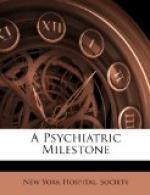Much is gained by the frank recognition that man is fundamentally a social being. There are reactions in us which only contacts and relations with other human beings can bring out. We must study men as mutual reagents in personal affections and aversions and their conflicts; in the desires and satisfactions of the simpler appetites for food and personal necessities; in the natural interplay of anticipation and fulfilment of desires and their occasional frustration; in the selection of companionship which works helpfully or otherwise—for the moment or more lastingly throughout the many vicissitudes of life. All through we find situations which create a more or less personal bias and chances for success or failure, such as simpler types of existence do not produce. They create new problems, and produce some individuals of great sensitiveness and others with immunity—and in this great field nothing will replace a simple study of the life factors and the social and personal life problems and their working—the study of the real mind and the real soul—i.e., human life itself. Looking back then this practical turn has changed greatly the general view as to what should be the chief concern of psychology. One only need take up a book on psychology to see what a strong desire there always was to contrast a pure psychology and an applied psychology, and to base a new science directly on the new acquisitions of the primary sciences such as anatomy and histology of the nervous system. There was a quest for the elements of mind and their immediate correlation with the latest discoveries in the structure of the brain. The centre theory and the cell and neurone theory seemed obligatory starting-points. To-day we have become shy of such postulates of one-sided not sufficiently functional materialism. We now call for an interest in psychobiological facts in terms of critical common sense and in their own right—largely a product of psychiatry. There always is a place for elements, but there certainly is also a place for the large momentous facts of human life just as we find and live it.
Thus psychiatry has opened to us new conceptions and understandings of the relation of child and mother, child and father, the child as a reagent to the relations between mother and father, brothers and sisters, companions and community—in the competitions of real concrete life. It has furnished a concrete setting for the interplay of emotions and their effects.
It has led us from a cold dogma of blind heredity and a wholesale fatalistic asylum scheme, to an understanding of individual, familiar, and social adjustments, and a grasp on the factors which we can consider individually and socially modifiable. We have passed from giving mere wholesale advice to a conscientious study of the problems of each unit, and at the same time we have developed a new and sensible approach to mental hygiene and prevention, as expressed in the comprehensive




